Residents’ Concerns for The Environment, and Loss of Quality of Life for People
More of your views - and pictures - this is YOUR forum, tell us what you think savetheribble@tiscali.co.uk
You can double-click on the pictures to see a more detailed image.
‘Having grown up in Penwortham and having lived here for 40 years, the River and its adjoining countryside has always been an important part of my life – both as a young child and an adult. The River area has offered great open space for recreation. I can’t believe that Preston City Council and South Ribble Borough Council, without any consultation with local people who use and value this area, wants to sacrifice it for the sake of profit and their own prestige. The Ribble does not belong to Preston City Council or South Ribble borough Council, and is not theirs to do with as they please'.
Chris, Leyland Road, Penwortham.

Preston Junction Nature Reserve
‘I feel so angry that this barrage and building development proposal is even being considered. The Ribble is vitally important to wildlife and the entire ecosystem on a local, national and international level, and it is vitally important to the people who live here. To even consider such a damaging project is madness. Why is this endless desire to destroy the environment at the heart of any proposal for so-called “development”? Why isn’t the preservation of the environment itself seen as development? ‘Sustainable development’ is just another buzz-word not a genuine aim. We are told by the Council and other organisations that support the barrage and development on our green belt that it is for our own good, but why do they think we live here? We already know what is for our own good, and chose to live in an area where a fantastically beautiful river and open countryside is just a few minutes from our homes, offering us priceless peace and quiet and access to nature without having to sit in a car on the motorway for hours in the pursuit of these very things which we now have. If we wanted to live in the centre of a sprawling city landscape like Liverpool or Manchester, that is where we would live. Our kids play on the fields and alongside the river for hours, they absolutely love it. We need to preserve the Ribble and our green belt for the sake of the environment, and for the sake of our children and generations to come.’
Jane, Middleforth.
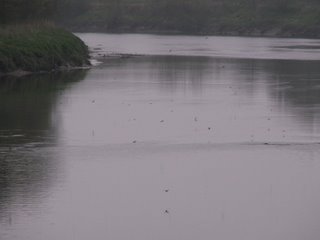
Hundreds of Swallows, Swifts, and House Martins return to the Ribble. These birds not only feast on the many insects over the Ribble and surrounding greenbelt, but the Swallows and House Martins use the mud revealed at low tide to build their nests under our eaves... double-click on this picture to see these birds in more detail.
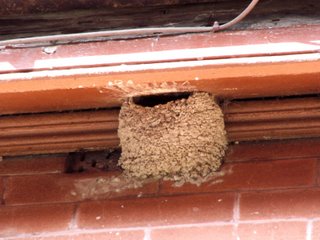
‘We are now at a time when worldwide environmental issues are of great concern to all of us. Scientists the world over are in agreement that unless we act now and put the environment at the forefront of our political and social thinking, there will be serious repercussions that we may never recover from. It is of great importance to me that environmental considerations need to be recognised at a local level.
Before undergoing any such transformations we must always consider the environmental impact both short and long term. The river barrage and building plans will have a negative impact on the environment both in the short and long term, affecting marine life, birds, and threatening precious green belt land. As a local resident, I see it as my duty to oppose the barrage and thus in some small way play my part in the great tide of like-minded people who consider the environment and nature more important than money and profit.’
Darren, Broadgate.
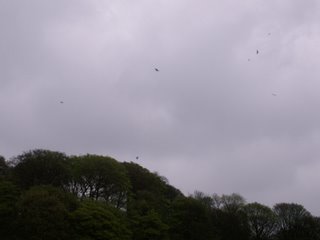
Swallows, Swifts and House Martins soaring over the green belt in Penwortham, the first sign of summer!
· The Governments’ own research and stated policy for the future states that bird species are indicators of the stability of the environment AND are indicators of quality of life for people. The Governments’ Quality of Life Counts 1999, Update 2004 ( www.sustainable-development.gov.uk/ click on publications) states that all bird species in the UK are in long-term decline, and ‘populations of some farmland birds such as the skylark and corn bunting, and of woodland birds such as the song thrush and bullfinch, have fallen by more than half’ (1999).
The 2004 Update suggests that ‘Farmland bird populations fell by 42% between 1970 and 2002, and woodland bird populations fell by 15%’ in the same period, although there are now suggestions that this decline may be slowing.
All of these bird species populate our green belt areas currently under threat of development from the Riverworks proposals.
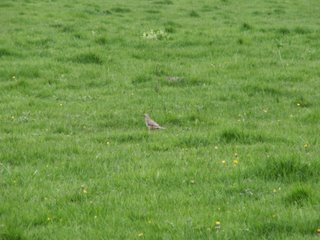
Thrushes are a common sight on the meadows opposite Avenham and Miller Parks, and these meadows and woodlands are what makes Preston so unique, barely five minutes walk from the city centre...
These reports also state that the quality of our rivers are important as ‘Rivers… support a wide variety of wildlife and are used extensively for recreation’ (1999).
Bird species are regarded as ‘good indicators of the broad state of wildlife… because they are wide-ranging and tend to be at or near the top of the foodchain’. We already know that ‘We value wildlife for its own sake’, but the Government do also recognise that wildlife is a valuable indicator of ‘our quality of life’.
See also the RSPB:
www.rspb.org.uk/science/survey/2001/quality_of_life_indicators.asp
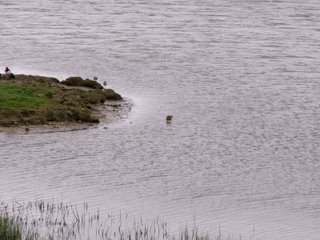
Icelandic Godwits and Oystercatcher, Freckleton marshes
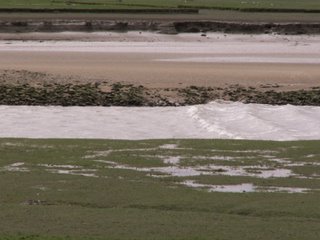
Ribble Tidal Bore at Freckleton. It's not the Severn Bore, but marvelous to see nonetheless, another thing lost to us forever if the barrage is built...
of course, the Severn is also now at risk from a proposed barrage...

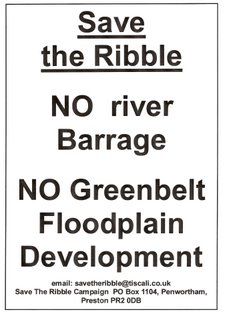













1 Comments:
Gosh that's some gorgeous countryside you've got there. I haven't been to the UK since 97 when I BritRailed across England and Wales. It was pretty then. I even stayed in Cardiff (where you have linked a good example of a bad project). I thought the town was decent on its own right back then.
In any case, it sounds like you have your hands full. When the developer(s) are well funded and the political establishment is in favor or in bed with the developers, the opposition is at a huge disadvantage. It is not insurmountable of course, but you certainly have to be dedicated and above all, researched EVERYTHING about the project area.
I am a planner by profession and used to work for a county in California as a natural resource planner of sorts. It sounds like a lofty and noble description, but since my county was pro-development what that meant was my primary duties were to facilitate mining and oil and natural gas drilling. This made for quite a tug-of-war between the developers and their political allies that oversaw county administration and the opposition groups. Almost every mine was contentious. It taught me several valuable lessons:
1. Money talks. Deep pocketed companies can simply outspend the opposition, wearing them down and buying needed political cover.
2. The law (still) rocks. No matter how much these companies want it, every decision has to have legal cover. What really helped two different opposition groups stop two controversial proposed mines was a failure by each firm to follow all of the laws. Astute researchers on both projects caught inconsistencies with each and used that as legal leverage to stop the project.
I know nothing about British environmental laws, but in California they were very accessible to opposition parties. Our national propensity to sue here in the US for just about anything made for a number of lawyers eager to take up arms for the right price. I'd highly recommend legal counsel on any serious challenge and a number of detail-oriented researchers to investigate every possible legal angle, no matter how far back.
In a fight over a proposed development on abandoned rail lines in a town near San Francisco, a legal researcher found an 80-yr old contract that stipulated the rail road would turn the property over to the city at 1920's era prices should rail road usage ever cease. The city and the railroad were not aware of this contract. It is those kinds of finds that are absolutely priceless!
I have a good example of a citizen's group stopping a mining project that threated to dig up an entire creek channel (one of the few remaining virgin ones too) in my former county. If you are interested, drop me a line
(Thanks for posting on my site BTW)
email: unplanning "at" yahoo.com
Post a Comment
<< Home